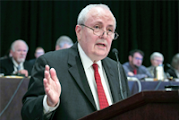APA today released a new practice guideline for the pharmacological treatment of alcohol use disorder (AUD). Despite the high prevalence of AUD and its significant public health consequences, patients with this disorder remain undertreated.
“This new guideline is an important step in bringing effective, evidence-based treatments for alcohol use disorder to many more people and in helping address the public health burden of alcohol use,” APA President Anita Everett, M.D., said in a press release.
The guideline aims to increase physician and public knowledge on the effectiveness and risks of the five medications that may be used for the treatment of AUD: acamprosate, disulfiram, gabapentin, naltrexone, and topiramate.
- Of these five, naltrexone and acamprosate have the best available evidence related to their benefits, and both have minimal side effects. As such, they should be considered the preferred pharmacological options for patients with moderate to severe AUD who want to reduce drinking or achieve abstinence. However, acamprosate should be avoided in patients with significant renal impairment, and naltrexone should be avoided in patients with acute hepatitis or liver failure, or in patients currently taking opioids or who may be expected to take opioids.
- Disulfiram, gabapentin and topiramate are also options for treatment of AUD but should typically be considered after trying naltrexone and acamprosate, unless the patient has a strong preference for one of these medications. Disulfiram is a special case as it does cause a series of adverse reactions if alcohol is consumed within 12 to 24 hours of taking the medication; the reactions include elevated heart rate, flushed skin, headache, nausea, and vomiting. Therefore, disulfiram is suggested only to patients who wish to achieve abstinence from drinking. Patients taking topiramate are at an increased risk of cognitive dysfunction, dizziness, and loss of appetite, whereas patients taking gabapentin may experience fatigue, insomnia, and headache.
While the guideline focuses specifically on evidence-based pharmacological treatments for AUD, it also includes recommendations and suggestions related to psychiatric evaluation of patients with AUD and developing a person-centered treatment plan. Evidence-based psychotherapeutic treatments for alcohol use disorder also play a major role in treatment and peer support groups such as Alcoholics Anonymous, and other 12-step programs can be helpful for many patients. However, specific recommendations related to these treatments are outside the scope of this guideline.
The full guideline, executive summary, and related materials are available here.
(Image: iStock/shironosov)




























